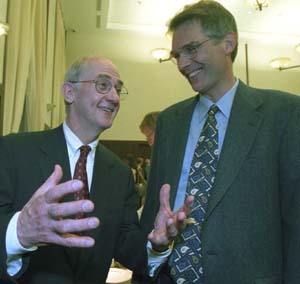Philip D. Stahl, who combines his numerous scientific accomplishments with an untiring devotion to education and mentorship, and Jonathan S. Turner, who is internationally recognized for his accomplishments in computer networks and telecommunications, will receive the University’s annual faculty achievement awards.

Stahl, Ph.D., the Edward Mallinckrodt Jr. Professor and head of the Department of Cell Biology and Physiology in the School of Medicine, is the recipient of the Carl and Gerty Cori Faculty Achievement Award
Turner, Ph.D., the Henry Edwin Sever Professor of Engineering in the Department of Computer Science and Engineering, is the winner of the Arthur Holly Compton Faculty Achievement Award.
Chancellor Mark S. Wrighton made the announcement at the Chancellor’s Gala April 17 at the Charles F. Knight Executive Education Center. The awards will be conferred at the Faculty Achievement Awards Program this fall.
“It is extremely rewarding to have the opportunity to work with outstanding faculty at Washington University,” Wrighton said.
“This year, it is privilege to recognize Professor Philip Stahl as the recipient of the Carl and Gerty Cori Faculty Achievement Award. He has been an exceptionally creative and prolific scientist, and he has also been one of our most effective and distinguished academic leaders as a department head in the School of Medicine.
“It is also wonderful to recognize Professor Jonathan Turner as the 2004 recipient of the Arthur Holly Compton Faculty Achievement Award. He has made pathbreaking fundamental contributions and has also made advances that have had profound practical applications.
“These two faculty achievement awardees represent tremendous contributors to our quality and impact as a leading research university.”
The selection committee for the awards includes three members each from Arts & Sciences and the medical school and one member from each of the University’s other six schools.
Criteria for selection are:
• Outstanding achievement in research and scholarship;
• Recognized prominence within the community of scholars;
• Service and dedication to the betterment of the University; and
• Respected accomplishment in teaching.
The awards include a $5,000 honorarium.
As head of cell biology and physiology for the past 20 years, Stahl has successfully recruited and mentored 19 faculty members. Last year, he was also named director of the Division of Biology and Biomedical Sciences.
He was the first man to receive the Women in Cell Biology Senior Career Recognition Award from the American Society for Cell Biology for his work on recruiting and mentoring women.
Stahl has also been an avid supporter of the educational mission of the University. He was instrumental in the conception of the new Farrell Learning and Teaching Center, which will foster formal and informal interactions among students as well as provide state-of-the-art teaching and seminar facilities.
Stahl is recognized for his investigations into the mechanisms involved in endocytosis, the process through which cells absorb external substances such as proteins. He is studying endocytosis and signal transduction in cancerous cells in an effort to understand how growth signals are internalized into cells.
Stahl is also investigating the ways in which pathogens and cellular debris are transported to sites inside cells where they can be broken down and destroyed.
Turner’s early work on high-performance packet-switching systems and networks played a central role in the development of Asynchronous Transfer Mode technology, a flexible, reliable and efficient communications technology that was developed to enable voice, data and video applications to co-exist in a common, high quality communications infrastructure.
With colleagues Jerome R. Cox Jr. and Guru Parulkar, Turner has led a series of major research projects that has contributed to the development of high-performance network technology and multimedia applications.
In 1997, the three also founded Growth Networks, a successful startup company, which developed electronic components for Internet routers with aggregate capacities of more than 10 trillion bits per second. In 2000, the company was acquired by Cisco Systems, which is expected to soon complete new high-performance systems based largely on the ideas and technologies developed at Growth Networks.
Turner’s recent work centers on methods for improving the performance of Internet routers and making them more flexible by enabling them to host network plug-ins that serve as network-resident assists for end-to-end applications.
He has authored many widely cited publications and holds more than 20 patents for his work in high-performance communication systems.